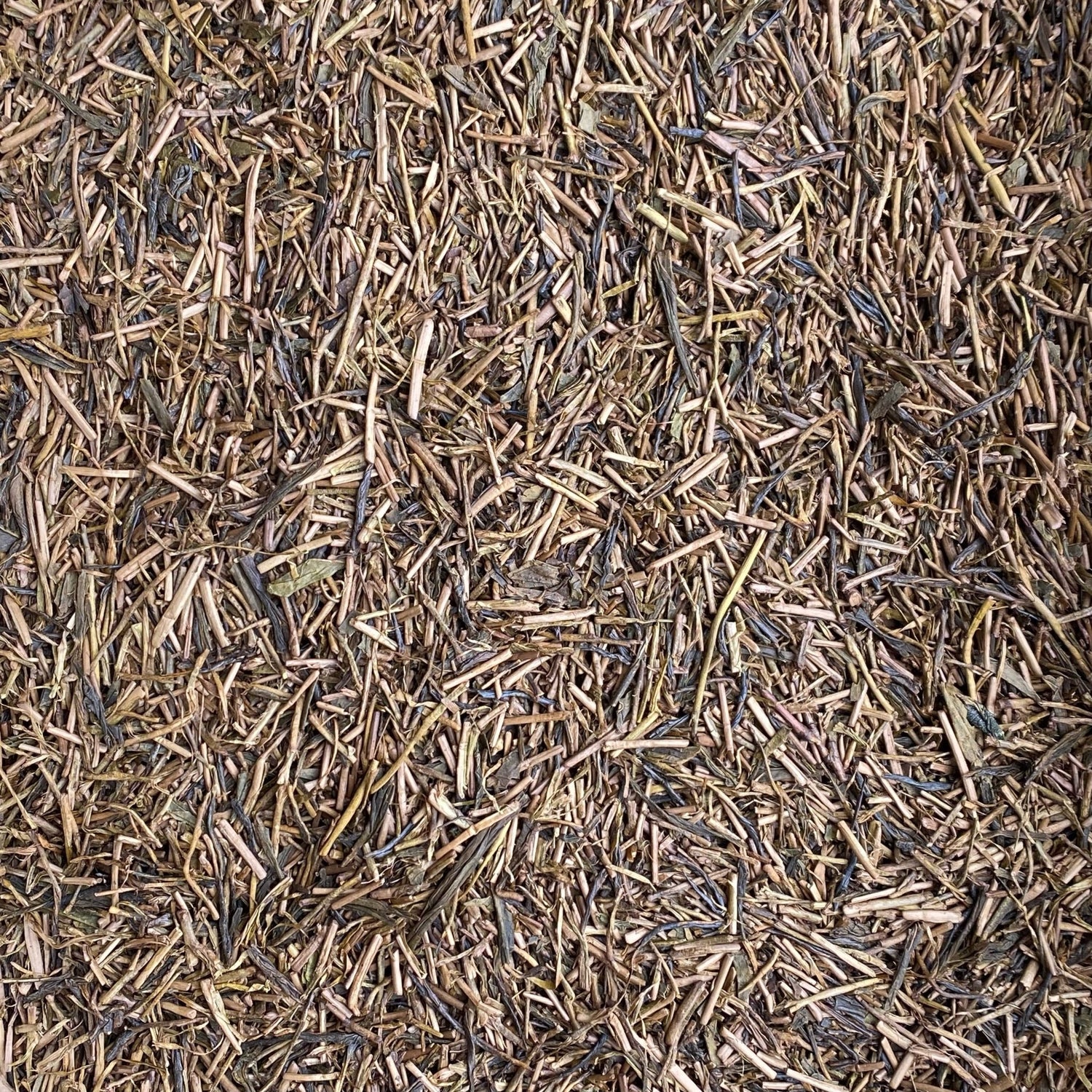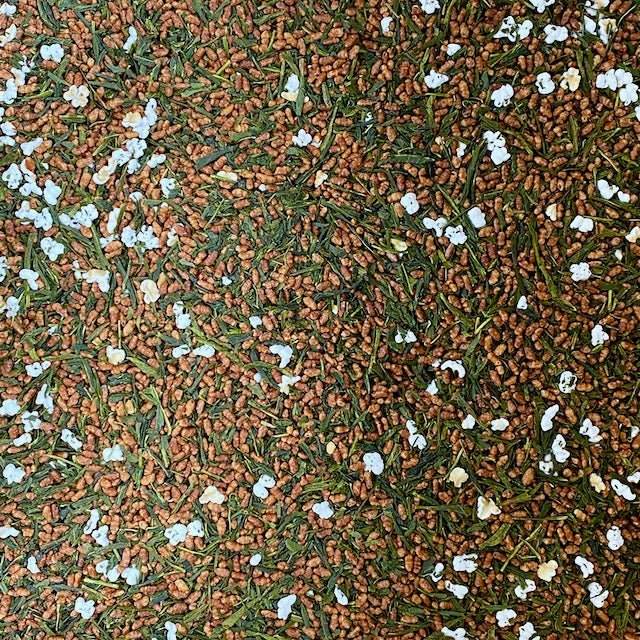Sort by:
67 products
67 products
About
This is one of the most ancient and arguably famous styles of black tea. With notes of dark fruit and mild content of tannins, this tea creates a very elegant brew.
Origin
This tea grows in the Yellow Mountain (黄山) region, in Anhui Province. This garden is at an altitude of more than 1200 m above sea level.
Garden Manager
Zha Weiming
|
Tea |
3g (~1 tbsp) |
|
Water |
240ml (1 cup) |
|
Temperature |
100°C (212°F) |
|
Steep Time |
210 seconds |
Step into the misty, mystical mountains of Kirishima, where ancient traditions meet modern craftsmanship.
Our Kirishima Hojicha Kukicha captures the essence of this Japanese landscape in every sip.
Roasted to perfection, this unique tea (crafted with tender young twigs, rather than leaves) unveils a warm, toasty flavour with subtle hints of roasted barley and brown sugar.
The low level of caffeine makes this brew perfect for any time of day.
We love it for a stormy night.
Origin
This tea was grown organically and handcrafted on the Island of Kyushu, in Japan. It grew amid cedar trees, on soils fertilized by the volcano Sakurajima, one of the most active in Japan. It is easily one of the most gentle, comforting teas we’ve experienced in this region.
Recommendations
- Tea: 3g / 1 tbsp
- Water: 240ml / 1 cup
-
Temperature: 100°C / 212°F
- Steep: 220 seconds
About
When first sipped, this tea delivers an intense smokey aroma.
Shortly after, that smokey flavour gives way to a delightfully full-bodied black tea.
This potent-yet-balanced version of the most famous style of smokey tea in the world is delicious hot or iced.
Origin
This tea grows in the Yellow Mountain (黄山) region in Anhui Province between 200m and 800m above sea level.
Recommendations
- Tea: 3g / 1 tbsp
- Water: 240ml / 1 cup
-
Temperature: 100°C / 212°F
- Steep: 90 seconds
About
All the goodness of your daily organic matcha, with a boost of the best organic lion’s mane extract we could find.
Ingredients:
Organic matcha powder, organic lion’s mane extract
____________
More on Lion's Mane
Latin name: Hericium erinaceus
Lion’s mane is an edible and medicinal mushroom native to all continents in the Northern hemisphere; it is also known as monkey head mushroom, bearded tooth mushroom, satyr's beard, bearded hedgehog, and a variety of local names. Long known to traditional healers, particularly in relation to brain and nerve health, this mushroom’s popularity soared recently among modern health food seekers.
The following articles (related to this mushroom) are available at the website of the US National Library of Medicine. Please note the section about neurite outgrowth and regeneration of damaged nerves in the first one.
- Neuronal Health – Can Culinary and Medicinal Mushrooms Help?https://www.ncbi.nlm.nih.gov/pmc/articles/PMC3924982/
- Therapeutic Potential of Hericium erinaceus for Depressive Disorder. https://www.ncbi.nlm.nih.gov/pmc/articles/PMC6982118/
- Gastroprotective Effects of Lion's Mane Mushroom Hericium erinaceus(Bull.:Fr.) Pers. (Aphyllophoromycetideae) Extract against Ethanol-Induced Ulcer in Rats
https://www.ncbi.nlm.nih.gov/pmc/articles/PMC3835629/
About
This delicious, healthy blend of maca and hojicha is your childhood favourite, chocolate milk, all grown up. It's the closest you'll get to that flavour without any actual chocolate.
Recommendations:
We highly recommend expressing this in an oat milk latte, hot or iced. Trust the experts. Thank us later.
Ingredients
Organic hojicha, organic maca powder
____________
More on Maca
Latin name: Lepidium meyenii
Maca, sometimes called ‘Peruvian ginseng’, is a native plant of the Andean highlands, growing mostly at altitudes over 4000m above sea level. In recent years, maca achieved super-stardom in North America, boosted by reviews from influencers like David Asprey (Hack your Sex Drive with Maca Root | https://blog.daveasprey.com/hack-your-sex-drive-with-maca/) and Men’s Health Magazine (Can Maca Powder Boost Your Energy and Sex Drive? Here's What You Should Know
https://www.menshealth.com/nutrition/a19544647/maca-powder-benefits/)
Why should you include it in your diet? Quoting Health Canada on benefits that have been solidly established:
- Source of/Provides antioxidants.
- Helps to support emotional aspects of sexual health.
- Helps to support healthy mood balance during menopause.
Source: http://webprod.hc-sc.gc.ca/nhpid-bdipsn/atReq.do?atid=maca.lepidium.meyenii&lang=eng
And for scholarly geeks, we recommend the following articles:
- Ethnobiology and Ethnopharmacology of Lepidium meyenii (Maca), a Plant from the Peruvian Highlands
-
Hormone-Balancing Effect of Pre-Gelatinized Organic Maca (Lepidium peruvianum Chacon): (I) Biochemical and Pharmacodynamic Study on Maca using Clinical Laboratory Model on Ovariectomized Rats
https://www.ncbi.nlm.nih.gov/pmc/articles/PMC3614604/ -
Preservation of Cognitive Function by Lepidium meyenii (Maca) Is Associated with Improvement of Mitochondrial Activity and Upregulation of Autophagy-Related Proteins in Middle-Aged Mouse Cortex
https://www.ncbi.nlm.nih.gov/pmc/articles/PMC5018343/
Your favourite spiced chai, elevated with powerful Peruvian maca.
Ingredients:
Organic maca powder, organic cinnamon, organic ginger, organic cardamom, organic pepper, organic star anise
____________
More on Maca
Latin name: Lepidium meyenii
Maca, sometimes called ‘Peruvian ginseng’, is a native plant of the Andean highlands, growing mostly at altitudes over 4000m above sea level. In recent years, maca achieved super-stardom in North America, boosted by reviews from influencers like David Asprey (Hack your Sex Drive with Maca Root | https://blog.daveasprey.com/hack-your-sex-drive-with-maca/) and Men’s Health Magazine (Can Maca Powder Boost Your Energy and Sex Drive? Here's What You Should Know
https://www.menshealth.com/nutrition/a19544647/maca-powder-benefits/)
Why should you include it in your diet? Quoting Health Canada on benefits that have been solidly established:
- Source of/Provides antioxidants.
- Helps to support emotional aspects of sexual health.
- Helps to support healthy mood balance during menopause.
Source: http://webprod.hc-sc.gc.ca/nhpid-bdipsn/atReq.do?atid=maca.lepidium.meyenii&lang=eng
And for scholarly geeks, we recommend the following articles:
- Ethnobiology and Ethnopharmacology of Lepidium meyenii (Maca), a Plant from the Peruvian Highlands
-
Hormone-Balancing Effect of Pre-Gelatinized Organic Maca (Lepidium peruvianum Chacon): (I) Biochemical and Pharmacodynamic Study on Maca using Clinical Laboratory Model on Ovariectomized Rats
https://www.ncbi.nlm.nih.gov/pmc/articles/PMC3614604/ -
Preservation of Cognitive Function by Lepidium meyenii (Maca) Is Associated with Improvement of Mitochondrial Activity and Upregulation of Autophagy-Related Proteins in Middle-Aged Mouse Cortex
https://www.ncbi.nlm.nih.gov/pmc/articles/PMC5018343/
About
Smooth, rich black tea with big chunks of premium spices.
Cardamom, cinnamon, pepper, ginger, cloves, nutmeg, and black tea make this a well-rounded, smooth, easy-sipping chai.
Origin
Blended in Richmond, BC.
Recommendations
- Tea: 5g / 2 tbsp
- Water: 500ml / 2 cup
- Directions: Simmer tea on the stove for about 5 minutes before straining.
About
This delicious chai flavoured matcha latte mix is a perfect option for those who are new to matcha or prefer their drinks on the sweeter side.
Recommendations
Add 2 tablespoons latte mix and one cup of milk (hot or iced) into a thermos or shaker bottle of your choosing. Shake for 15 seconds and serve!
Ingredients
Organic sugar, organic premium grade matcha (stone-ground tea), organic spices (cardamom, ginger, star anise, cinnamon), organic flavour.
About
This delicious coconut flavoured matcha latte mix is a perfect option for those who are new to matcha or prefer their drinks on the sweeter side.
Recommendations
Add 2 tablespoons latte mix and one cup of milk (hot or iced) into a thermos or shaker bottle of your choosing. Shake for 15 seconds and serve!
Ingredients
Organic sugar, organic premium grade matcha (stone-ground green tea), organic coconut powder, organic flavour.
About
Delicate and harmonious, Organic Meiji Sunset invites you into a world of enchanting contrast. Embrace bright notes of dark fruit, a ballet of balanced tannins, and a well-rounded mouthfeel.
This tea is an ode to intensity wrapped in elegance, and is a perfect companion to a luxurious breakfast or 5pm break.
It requires no accompaniment of milk or citrus, as the inherent power of the flavour shines through; however, it graciously accepts the company of either, merging strength with subtlety.
Origin & History
Embark on a sensory journey to Tanegashima, a jewel among the Osumi Islands in the southern Kagoshima Prefecture. Tanegashima's volcanic soil is nurtured by abundant rainfall, and the land is home to a breathtaking array of birds.
In the bygone eras of Meiji and Taisho, Japan crafted black tea of unparalleled quality for export to the Western world. Alas, the tides of a World War and the rise of the British Empire's Eastern colonies as the preferred origin for black tea dimmed Japan's export glow. Today, only a small fraction of Japanese tea is made in a 'black' style.
Kuritwase (Tanegashima's emblematic cultivar) is a rarity elsewhere in Japan. Celebrated for yielding exceptionally delicious tea, both green and black, it weaves a tale of tradition and taste.
Origin: Tanegashima, Japan
Recommendations
- Tea: 3g / 1 tbsp
- Water: 240ml / 1 cup
-
Temperature: 100°C / 212°F
- Steep: 90 seconds
Discover the comforting embrace of our Organic Morimachi Genmaicha, a harmonious blend of bright, steamed green tea and roasted rice.
Sourced from the foothills of Mount Fuji, this tea offers a unique, toasty flavour that is both soothing and invigorating. Each sip evokes a sense of warmth and tranquility, transporting you to a peaceful moment of reflection and calm.
Perfect for any time of day (if you aren't caffeine sensitive), let the balanced richness of Genmaicha be your companion in finding serenity and comfort.
Origin & History
Genmaicha was originally created to make use of lower-quality sencha, as the roasted rice softened any astringency.
In this case, we're using a sencha that is delicious on its own, because we love the flavour of a high-quality genmaicha.
This particular batch of Genmaicha comes from the foothills of Mount Fuji.
Recommendations
- Tea: 3g / 1 tbsp
- Water: 240ml / 1 cup
-
Temperature: 80°C / 176°F
- Steep: 220 seconds
Our delicious, Organic Iron Goddess of Mercy oolong enhanced with Osmanthus flowers.
About
Our Iron Goddess tea is a lightly oxidized oolong with notes of flowers, poached leafy greens, and a buttery finish.
While there are varying levels of oxidization available for Iron Goddess of Mercy (the base of this tea), from very green (flowery flavour) to highly oxidized (ideally charcoal fired, and much warmer in energy), this particular batch is of a modern style, and therefore more lightly oxidized.
Origin & History
Tie Guanyin (Iron Guanyin, or Buddhist Goddess of Mercy | 鐵觀音) is one of the most popular oolong teas in China. This famous style of oolong tea is originally from Anxi, in Southern Fujian Province, and is one of the most treasured teas in Guangdong (previously known as Canton).
While Anxi is known as the birthplace of Iron Goddess, we had long been unsuccessful in finding an organic garden that we would be proud to source tea from.
Since the area is quite famous, too many farms practice an intensive kind of agriculture that is not considered sustainable.
Through some good friends in Huang Shan, we learned of an organic tea garden in San Mi, around 250km inland from Anxi. The garden is located on mountainous land at 500m (~1500ft) above sea level, well away from large industrial populations. This garden farms some very tasty organic tea!
About
This is a unique, very aromatic peppermint from a biodynamic grower.
Peppermint is known to deliver cooling energy and powerful sinus-opening properties, in addition to promoting relaxation. A great option when you're fighting off a cold.
Origin & History
Just one of over 600 different known varieties of mint, peppermint became ubiquitous for a reason.
Peppermint is a natural hybrid of water mint (mentha aquatica) and spearmint (mentha spicata) and was first cultivated in England in the late seventeenth century.
Grown in Cascadia, this soothing, cooling, caffeine-free peppermint is a staple for any tea lover who wants to relax and unwind.
In holistic medicine and aromatherapy, peppermint tea and/or oil is commonly used to assist with a wide array of issues, including:
- digestive upsets
- tension & migraine headaches
- clogged sinuses
- muscle aches & joint pain
- stress
- menstrual cramps
Experience the refined elegance of our Organic Premium Dragon Well (Long Jing) tea, hand-picked in early spring from the serene tea gardens of Yellow Mountain.
This exquisite green tea captures the essence of its storied origins with a rich, nutty flavour and a clear, yellow-green infusion.
Each sip brings a moment of pure tranquility, inviting you to pause and appreciate the delicate craftsmanship and natural beauty that define this celebrated tea.
Origin & History
Dragon Well or Long Jing (龙井 in simplified Chinese | 龍井 in traditional Chinese) is one of the most famous styles of green tea in China. It originated in Hangzhou's West Lake region, in today's Zhejiang Province, China.
There are two cultivars used for the vast majority of this tea:
- "Bendi" (or native) is the oldest, heirloom cultivar
- "43" is a younger cultivar, developed in the latter part of the 20th century, and is commonly used to improve yields.
This particular batch of Dragon Well tea comes from the fabled Yellow Mountain, in Anhui province. They are using Bendi cultivar in a pristine tea garden, which yielded the best value-for-money (aroma, taste & environmental stewardship) among all the Dragon Well samples that we tried this year.
We chose this origin because it is much farther than West Lake from major urban developments, and because these particular growers have been supplying us with delicious, organically grown tea for over 10 years.
Recommendations
- Tea: 4g / 1 tbsp
- Water: 240ml / 1 cup
-
Temperature: 75°C / 167°F
- Steep: 220 seconds
Embark on a bold journey with our Organic Premium Gunpowder tea.
Known for its intense, robust flavour, this classic Chinese green tea, called Zhu Cha or "Pearl Tea", offers a dynamic experience.
The tightly rolled leaves unfurl to release a strong, invigorating taste that awakens your senses.
Perfect for starting your day with energy and focus, let the rich heritage and powerful essence of Gunpowder tea elevate your tea ritual.
History & Origin
Production of gunpowder green tea reportedly started in the Tang Dynasty. The handcrafting method differs from other Chinese pan-fired green teas as 'gunpowder' is slightly withered, steamed, rolled, and dried.
The steaming step is unconventional for pan-fired green teas (typically you'll see only one of either steaming or pan-firing), but this additional step creates a bolder, in-your-face green tea that is ideal to wake up with.
This batch of tea was farmed organically in the hills of Central Hunan Province.
Recommendations
- Tea: 3g / 1 tbsp
- Water: 240ml / 1 cup
-
Temperature: 80°C / 176°F
- Steep: 220 seconds
About
A smooth, rich, woody Pu Er made from chunky leaves.
Delicious to drink as-is, with great aging potential.
Origin & History
Pu Er is, simply put, fermented tea that comes from Yunnan Province, China.
This particular batch was grown in Simao (Pu Er), Yunnan, China, anaerobically fermented for 40 days, and harvested in May of 2022.
While you can get tea from many other regions, it should only be called Pu Er if it is made in Yunnan (just like sparkling wine can only be champagne if it is Produced in Champagne, France).
If a great-tasting tea isn’t enough on its own, for centuries the Chinese have attributed a wealth of health and digestive benefits to this tea, and recently, some celebrity North American health experts are recognizing the same.
Recommendations
- Tea: 3g / 1 tbsp
- Water: 240ml / 1 cup
-
Temperature: 100°C / 212°F
- Steep: 180 seconds, 3-4 steeps
About
Pu Er is, simply put, fermented tea that comes from Yunnan Province, China.
While you can get fermented tea from many regions, it should only be called Pu Er if it is made in Yunnan (just like sparkling wine can only be champagne if it is produced in Champagne, France).
Pu Er tea has a rich, earthy flavour unlike any other.
If a great-tasting tea isn’t enough on its own, for centuries the Chinese have attributed a wealth of health and digestive benefits to this tea, and recently, some celebrity North American health experts are recognizing the same.
About
There's nothing quite like the rich, pure, and naturally sweet flavour of Red Rooibos.
Like many herbal teas, Rooibos is known to boast a wide variety of health benefits. Most commonly, it's recognized for being:
- Loaded with antioxidants
- Rich in minerals such as calcium, iron, potassium, copper, manganese, magnesium, and zinc.
You'll often find Red Rooibos as the base for many fantastic herbal tea blends, because its flavour is mild, sweet, and complimentary to many other herbal ingredients.
Recommendations
- Tea: 3g / 1 tbsp
- Water: 200ml / 0.85 cups
-
Temperature: 95°C / 203°F
- Steep: 240 seconds













































